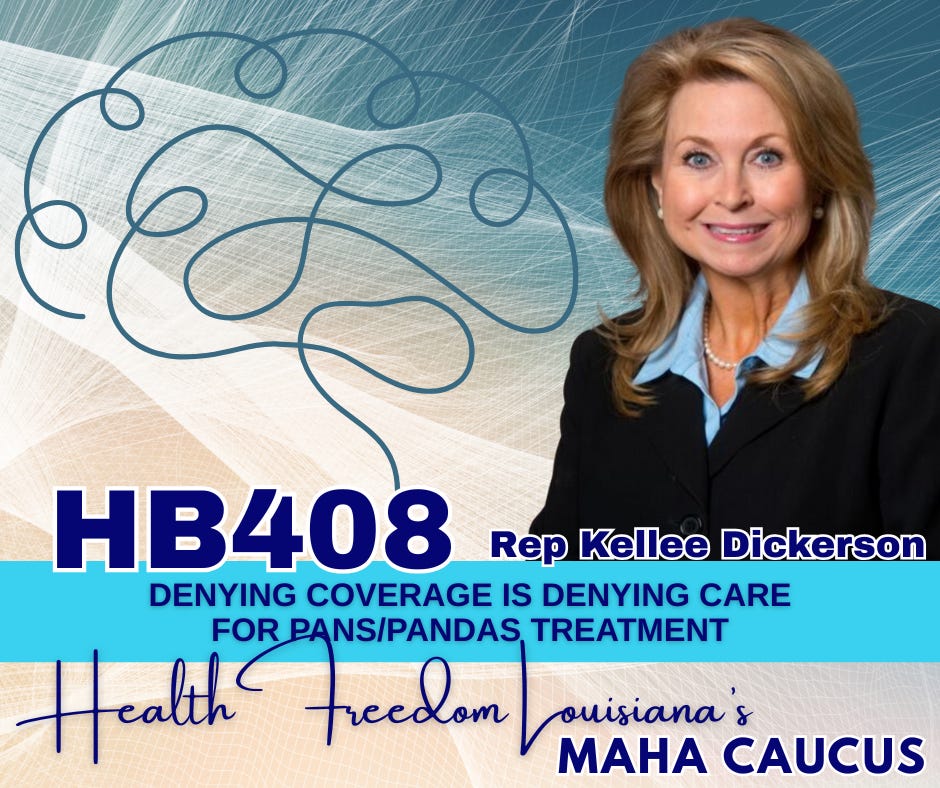Legislative Update: Key Health Freedom Victories and Setbacks This Week
Updates on HB690 the EUA bill, HB408 the PANS/PNDAS bill, HB150 the Food Freedom bill, and HB400 the Minor Consent Bill.
Let’s start with the victories!
Perhaps the biggest win of the legislative session is the passage of Representative Chuck Owen’s HB690. The bill directs the Louisiana Surgeon General to promulgate protocols for administering EUA medical interventions. HB690 essentially acknowledges that there were ZERO protocols in place for dispensing EUA drugs and interventions when COVID hit. People were denied informed consent and it cost lives.
This is one step in correcting a wrong and making it right going forward. With a vote of 39-0, it has bipartisan support.
Congratulations to Representative Owen!
Congratulations to State Representative Kellee Hennessy Dickerson on the unanimous passage of HB408!
This bill will require insurance companies to cover treatment of PANS/PANDAS! Families suffering from these catastrophic illnesses will now have more medical resources without breaking the bank.
It does not look like Representative Kim Coates’ HB150 will make it through the legislative process this session. The bill received a hearing late in session and because the process involves so many steps, it may not make it this session.
We look forward to supporting Rep Coates’ food freedom efforts in the future!
As we shared previously, we had several concerns regarding HB400 as it left the House, the most significant being the addition of “in loco parentis, formally and informally,” amongst the list of individuals who would be able to provide medical consent for a minor. With those words included, literally ANY adult could provide consent for medical and mental health treatment for ANY minor. Senators had similar concerns when the bill was heard in Senate Health and Welfare on Sunday.
We want to thank Representatives Chenevert and Horton for offering the amendment we requested to remove “informally” from the bill and include a definition of in loco parentis. Without a clear definition of in loco parentis, ANYONE “standing in place of a parent” (the literal translation) could seek medical treatment for ANY minor.
Senator Jackson-Andrews commented on informal in loco parentis, not realizing that phrase was being amended out. Her comments reflected our concerns.
Currently, the age of majority in Louisiana is 18, and medical consent is defined in RS 40:1159.4, which provides a hierarchy of consent with parents at the forefront. The laws in question that are being amended by HB400 allow minors to consent in certain situations, including if a minor believes that they have a disease, if the minor is in labor, if the minor is seeking substance abuse treatment, if the minor is seeking mental health counseling at school, and if the minor is donating blood. HB400 also addresses the issue of access to a minor’s medical records.
As HFL Co-Director Jill Hines noted in her testimony on Sunday, because vaccination is considered preventative care, vaccination would not be considered a treatment for an illness if a minor believed themself to have a disease. We have theorized, because of comments from pharmacists who have testified at the Capitol regarding the treatment of puncture wounds with a tetanus vaccine, that minors may be able to consent to tetanus, and also possibly HPV vaccination, BUT we have one guardrail to prevent that from happening—the National Childhood Vaccine Injury Act (NCVIA).
Pay close attention to the following:
NCVIA stipulates that a parent or legal guardian as defined by the states must receive a Vaccine Information Sheet prior to the administration of a vaccine. If HB400 redefines which adults can seek medical treatment for a child to include in loco parentis, any teacher, grandparent, camp counselor, babysitter, you name it, could take a child and get them vaccinated - or any medical treatment for that matter.
Additionally, HB400 keeps the provision from the existing law which provides a civil and criminal liability shield for healthcare providers treating a minor.
Do you see the reason for our concern?
Ultimately, too many questions were raised about the bill and it was deferred. Instead, a study resolution to determine the best option for amending the existing minor consent laws was suggested.
This was a valiant attempt by Representatives Chenevert and Horton to amend laws that truly need to be amended, but the addition of “in loco parentis, formally and informally,” opens the door for adults other than parents to authorize medical treatment for children without clear boundaries, oversight, or parental consent—undermining the very protections the bill should strengthen.
We look forward to supporting their future efforts to amend these laws.
Our advocacy is only possible with your help! THANK YOU!!








